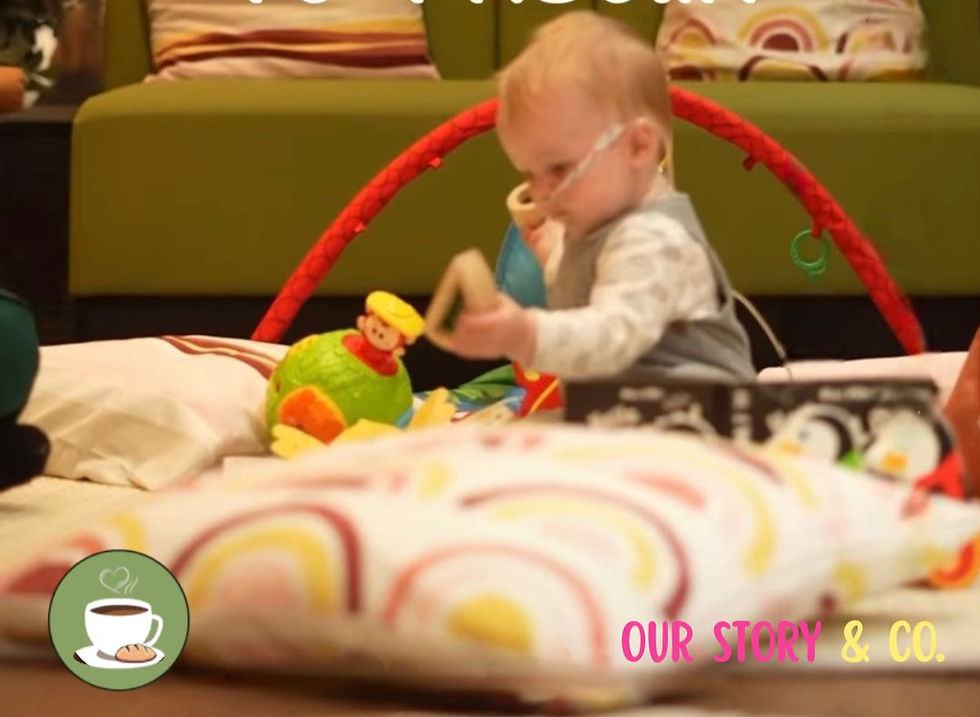“Again! Again!” – Why Children Love Repetition (and Why It Matters More Than You Think)
- Her Story & Co.

- Aug 22, 2025
- 3 min read
If you’ve ever read The Very Hungry Caterpillar so many times you can recite it in your sleep—or sat through the same episode of Bluey on repeat until you start questioning your own grip on reality—you’ve probably asked yourself:
“Why do kids do this to us?”
We see you. We’ve lived it too.
But here’s the thing: that seemingly endless repetition? It’s not just a quirky kid trait—it’s how their brains are wired to learn.
Repetition = Learning
Children aged 0–8 are like tiny scientists. They learn through observing, experimenting, and repeating. Over and over. And over again.
Each time your child hears the same story, sings the same song, or replays the same game, they’re:
Strengthening neural pathways in the brain
Building memory and understanding
Predicting what comes next (and feeling clever when they’re right!)
Developing confidence through mastery
Repetition isn’t laziness or lack of imagination. It’s their brain shouting, “Yes! I’m getting this!”

Repetition = Safety
The world is big, fast, and unpredictable when you're small. Repetition creates a sense of structure, predictability, and control.
Knowing what’s coming next helps children:
Feel secure and calm
Manage transitions
Build resilience in new or uncertain situations
So when your child asks for the same book every night for 3 weeks straight? They’re not trying to drive you up the wall—they’re grounding themselves in something familiar.
Repetition in Play
If your toddler insists on stacking and knocking over the same blocks a hundred times, or your preschooler keeps acting out the exact same café game (where you’re always the customer and they never have oat milk), don’t worry.
This kind of repetitive play helps children:
Refine motor skills
Make sense of social situations
Work through emotions
Practice and improve real-world skills
Repetition is their way of saying:
This is important to me. I’m not done learning from it yet.”
Okay But… How Do I Stay Sane?
We get it. There’s only so many times you can listen to the Frozen soundtrack before you start plotting Elsa’s early retirement.
Here are a few survival tips:
Switch roles: In pretend play, gently change your part or setting. “Today I’m a grumpy customer!”
Layer in variation: “Let’s read the story in silly voices tonight!”
Tag-team if you can: Swap storytime duties with a partner, friend, or willing grandparent.
Remind yourself (often): This isn’t a waste of time—it’s brain development in action.
Want to Understand More About How Your Child’s Brain Works?
At Our Story & Co., we’re all about helping you actually enjoy the early years (even the repetitive parts!).
Our Understanding Toddler Emotions workshop is packed with practical insights into how your child’s brain processes feelings—and how you can support them through big emotions (and big behaviour) with confidence.
Our Little Buds Course 🌱
If you’d love to explore child development in more depth, our Little Buds 4-week toddler course might be just what you’re looking for. Each week we cover a different aspect of toddlerhood—play, emotions, social skills, and self-regulation—giving you practical tools and insights to support your child’s growth (and keep your sanity intact).
It’s fun, evidence-based, and designed to help you feel more confident and connected as a parent.
In a Nutshell…
If your child is doing the same thing again (and again, and again)… don’t panic. They’re not stuck.
They’re learning.
And you? You’re doing a brilliant job.
✨ If you liked this blog, you may also enjoy our other posts → www.herstoryco.co.uk/blog




Comments